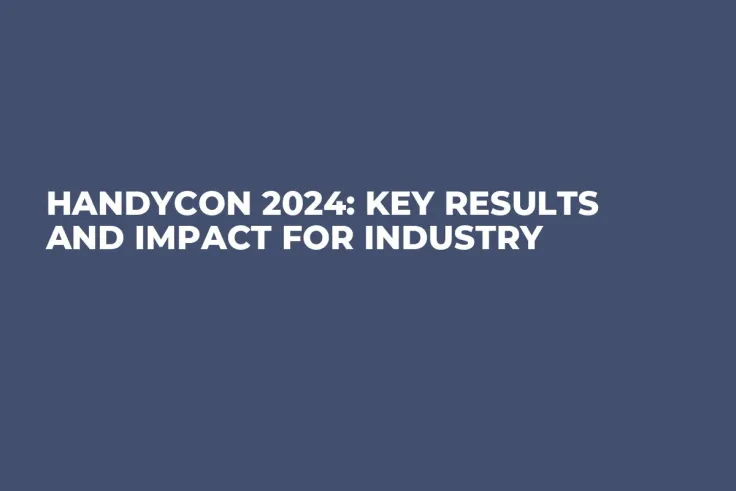
Disclaimer: The opinions expressed by our writers are their own and do not represent the views of U.Today. The financial and market information provided on U.Today is intended for informational purposes only. U.Today is not liable for any financial losses incurred while trading cryptocurrencies. Conduct your own research by contacting financial experts before making any investment decisions. We believe that all content is accurate as of the date of publication, but certain offers mentioned may no longer be available.
HandyCon 2024, co-hosted with Bitmain from March 13 to 15, marked its fourth annual celebration, turning heads in the cryptocurrency, technology and internet naming circles.
Major gathering of industry heavyweights: What was special about HandyCon 2024?
This year's event was a showcase of forward-thinking discussions, innovative ideas and a peek into the future of internet infrastructure, particularly through the lens of Handshake, a decentralized naming protocol that is shaking things up.
The conference opened with an engaging dialogue between Jehan Chu of Kenetic and Mike Michelini of SkyInclude, setting a compelling tone for what was to unfold. They laid the groundwork for understanding the current landscape and what the future holds, especially in the realm of digital naming and blockchain technology.
One of the highlights was the in-depth exploration of the soft fork by experts Alex Migliarini, Paul Web, Pei Hsun Kao and Nole Opperman. This session provided attendees with a deep dive into the complexities and advancements in blockchain technology, offering a glimpse into how these innovations could influence the future of the internet.
Tom Barett of EnCirca and Chjango Unchained took an intriguing look at the intersections of Web3 investments and trademarks. Their discussions illuminated the growing importance of intellectual property rights in a decentralized finance environment, a topic of increasing relevance as the digital and financial worlds converge.
A standout presentation was delivered by the Joseon Empire, introducing attendees to the world's first legally recognized cybernation. They demonstrated their innovative efforts within the Handshake ecosystem, including a proof of concept shared on GitHub by none other than their King.
Discussions on on-chain identity and the significance of decentralized naming systems were led by Beachfront and Arrene Ng. Their insights underscored the transformative potential of Handshake in redefining our digital identities and the foundational structure of the internet.
Handshake ecosystem gains traction in 2024
The event also highlighted diversity and inclusivity within the tech community, with inspiring talks from Margie Feng and the Women of Handshake. These sessions not only showcased the technical achievements within the Handshake ecosystem but also celebrated the diverse voices and perspectives contributing to its growth.
Investor interest in the Handshake ecosystem was evident, with notable figures like Steven McKie spotlighting the burgeoning investment opportunities. This interest signals a robust future for decentralized naming protocols and their potential to attract more stakeholders into the fold.
Andrew Lee, the founder of Handshake, shared insights into the project's vision and goals, emphasizing its mission to democratize internet naming. His presence, along with discussions from founding members JJ, Andrew Lee and Joseph Poon, reinforced Handshake's role as a pioneer in the push for a decentralized internet.
HandyCon 2024 not only exceeded attendance expectations but also sparked meaningful conversations about the future of Handshake and its impact on internet naming protocols. By focusing on decentralization and challenging the status quo, Handshake is at the forefront of efforts to build a more secure, resilient and inclusive digital world.
Handshake represents a shift away from centralized control over internet naming, offering a peer-to-peer system where users collectively manage the DNS naming zone. This approach not only enhances security and resilience against attacks but also promotes a more equitable and accessible internet.
 Vladislav Sopov
Vladislav Sopov Dan Burgin
Dan Burgin